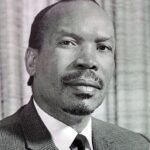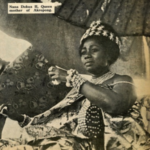THOMAS, JOHN HENRY
- 6 Min Read
John Henry ‘Malamah’ Thomas (February, 1845-January 17, 1922) of recaptive descent became a prosperous merchant and a leading figure among the Krios (Creoles) of Freetown. He was several times mayor of Freetown.

PHOTO CAPTION: John Henry Malamah Thomas. SOURCE: geni.com
John Henry, later nicknamed “Malamah”, was born in the village of Hastings, near Freetown, in February 1845 to John and Betty Thomas. His parents were Liberated Africans of the Egba (Yoruba) ethnic group. His father was a subsistence farmer, and his mother a laundress. At the age of three, John’s father died, and his mother had to work hard to bring him up.
Though his parents were Christians of the Anglican denomination, his mother could not at first afford to send him to the Anglican Day School, which was more expensive. John had to start school in 1849 at the Wesleyan Day school, where the fees were two pence a month. In 1856, however, John joined the Anglican school.
The poverty of his family made it impossible for him to attend school regularly. He had to spend two days of the week helping his mother by doing odd jobs in the neighbourhood, such as fetching firewood or cleaning ginger for money. In these circumstances, John had to leave school in 1859 and was unable to attend secondary school. He was, however, said to be good at arithmetic, though not at English grammar.
John entered business after leaving school through the agency of one of his father’s friends, a Mr. Thomas Macaulay. Macaulay had a business on the Rio Nunez River, and he took Thomas there to be trained. Board, lodging, and a few shillings’ monthly allowance was John’s initial remuneration. By 1867, however, the activities of the French on the Nunez forced many Krio traders out of that area. Mr. Macaulay had to transfer his business to the Scarcies River and took John with him as his clerk. But business was bad for Mr. Macaulay and he wound his company up that very year.
Because he valued John, however, Macaulay recommended him for a job with the Company of African Merchants, Ltd., which had recently begun trading in Sierra Leone. John joined this company in February 1868 and was immediately sent to the Sherbro branch as a bookkeeper. He was there until September 1872, when the company ended its Sierra Leone activities.
Again, his assuidity was to pay off, and an agent of the company took him to the branch at Calabar, in Nigeria, again as a bookkeeper.
By this time, however, John Thomas had married Christianna Rollings, the sister of T.J. Rollings, a shopkeeper in Westmoreland Street, Freetown. John went to Calabar with his wife, and it was while he was there that he decided to return home and set up on his own as a trader on the Rokel River. By now he was a reasonably successful man, and the confidence he had gained inspired great hopes of success in him. He had little capital to begin with, however, and a friend, Dr. Robert Smith, loaned him £100 with which he began.
Thomas started trading on the Rokel in December 1872. The loan was quickly paid off, and the business became established enough to compete effectively with other concerns on the Rokel. John built a factory at Malamah on the Rokel, which became the center of his business. From this time on he was nicknamed “Malamah.’
A few years later Ernest Vohsen, an agent for the Compagnie du Sénégal, (later the Compagnie Francaise de l’Afrique Occidentale, popularly known as C.F.A.O.), approached Thomas about working for that company. Vohsen, who was the company’s agent On the Scarcies, asked Thomas whether he would be willing to take over his functions. Thomas agreed and closed his business on the Rokel. Before taking up the post on the Scarcies, in October 1882 he opened a small shop in Freetown which he left in his wife’s charge. Thomas held the C.F.A.O. agency on the Scarcies until June 1888, when he resigned and returned to Freetown to prosecute his business more effectively. Under his supervision, the business expanded and prospered, and Thomas became one of the foremost merchants in the city. He built a beautiful house in East Street (still retained by his grandson), which became known as “Malamah House”.
It was the first of its kind in Freetown. The decorative carved heads on this house gave him another nickname ‘ed ed’ (head-head) Thomas. Thomas traded chiefly in cotton fabrics. He invented, and patented in England, his brand of cotton known as ‘Malamah baft’. Having gained wealth and security, Thomas participated in Freetown society on a grand scale. He dressed elegantly, smoked cigars, played billiards, and often visited England on business or for pleasure. In 1896, his daughter, Christianna, got married to Councillor C.C. Nicole, a Freetown contractor. John Malamah hired nearly half the houses in East Street for the ceremony. Many came from neighbouring villages to witness the event, and business in Freetown was virtually at a standstill for several days before the wedding.
Thomas also served both church and state. He was for 13 years warden of Holy Trinity Church at Kissy Road in Freetown. Later he became a treasurer of that church, as well as of the Sierra Leone Native Pastorate Church. In December 1891, he was appointed charity commissioner by Acting Governor J.J. Crooks and became commissioner of the peace in 1894.
In the Freetown municipal elections of 1903, he entered the city council for the East Ward. In 1904, he was elected mayor of Freetown and held that position in eight other years-1905, 1906, 1908, 1909, and 1911-14. In 1907, he was appointed as an unofficial member of the Legislative Council in Freetown. This was a position of high honour as there was usually only one indigenous member of that council.
Malamah Thomas was also president of the Kissy Road Traders Association. Some of his political activities went beyond Sierra Leone, for he became president of the local branch of the National Congress of British West Africa. This was a body, formed in 1920, advocating united political agitation for self-government among the African peoples of British West Africa. He supported the congress both with his time and his money.
John Malamah Thomas died in Freetown on January 17, 1922. He was deeply mourned, and the tribute in the local Sierra Leone Weekly News was testimony to the contribution he had made to Sierra Leone’s development.
C. MAGBAILY FYLE




